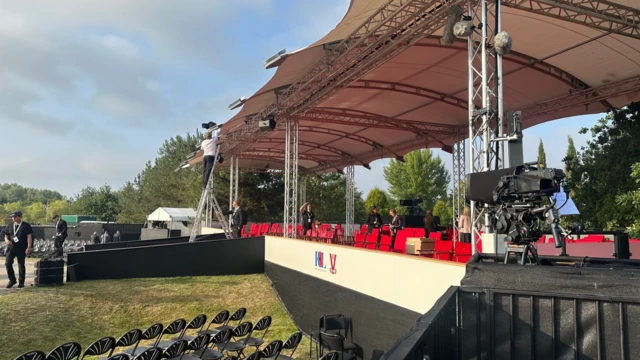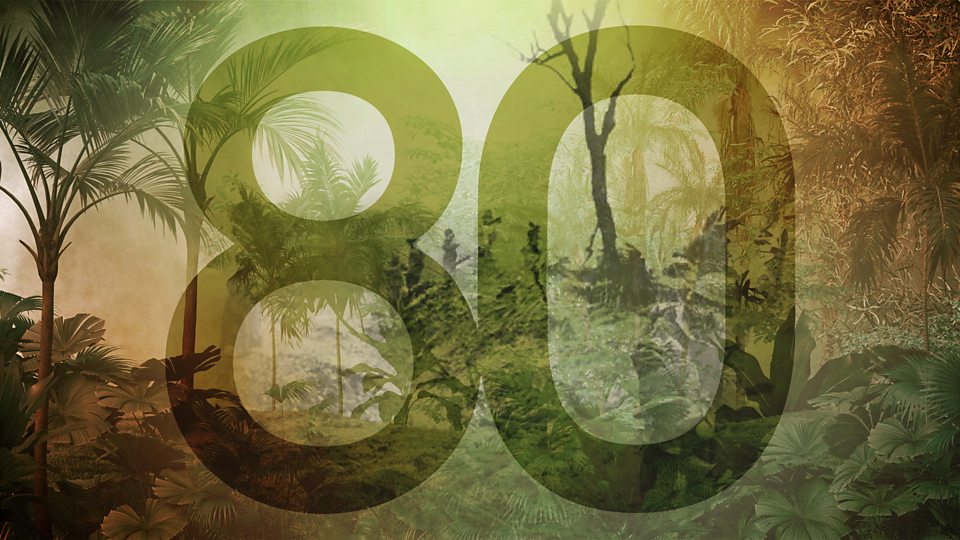King, Queen and PM lay wreaths at memorialpublished at 11:58 BST 15 August
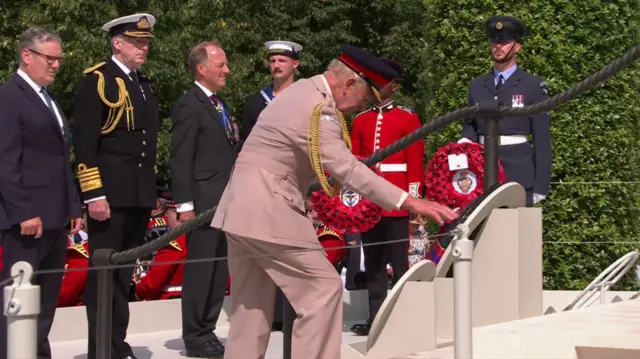
The King, Queen and prime minister have just laid wreaths and floral tributes at the memorial.
They will shortly lead the two minutes' silence.
The King and Queen lead a two-minute silence at a service in Staffordshire to commemorate 80 years since VJ Day
Among attendees are 33 veterans - former RAF pilot Ron Gumbley, 101, who served for a time in Burma, reads an excerpt of wartime poem For The Fallen
Meanwhile, Prime Minister Keir Starmer lays a wreath and the Red Arrows perform a flypast - here's a full recap of the remembrance event
Earlier, the King paid tribute to those who fought and died in Asia and the Pacific, saying they will "never be forgotten" - listen to the monarch's audio message
VJ Day, or Victory over Japan Day, is marked each year on 15 August - the date in 1945 when Japan surrendered to the Allied forces and World War Two ended
In Tokyo, PM Shigeru Ishiba expresses "remorse" in a speech - our correspondent says it's the first time in more than 10 years a Japanese leader has used the word in a war memorial address
Edited by Adam Durbin, with Ashitha Nagesh reporting from Staffordshire

The King, Queen and prime minister have just laid wreaths and floral tributes at the memorial.
They will shortly lead the two minutes' silence.
The UK will hold a national two-minute silence shortly at 12:00 BST to mark the 80th anniversary of the end of World War Two.
A service of remembrance will then honour those who fought and died in the war.
This is taking place at the National Memorial Arboretum in Staffordshire, press watch live at the top of the page to stream it - or you can watch it on BBC1 and BBC iPlayer.
King and Queen arrive for VJ Day service
We're seeing the first pictures of the King and Queen arriving at the VJ Day ceremony at the National Memorial Arboretum in Staffordshire.
The King is shaking hands with Prime Minister Keir Starmer and senior military officers, as the national anthem plays in the background.
 Ashitha Nagesh
Ashitha Nagesh
Reporting from the National Memorial Arboretum
Stan was just 19 when he was sent east in the summer of 1945.
He recalls being told that a bomb had been dropped in Hiroshima, but at the time he didn’t understand the historic, catastrophic significance of the nuclear strike.
Commemorations like today are deeply important, he tells us.
“It’s going to be the last one,” he says. “We won’t be around for the 90th.”
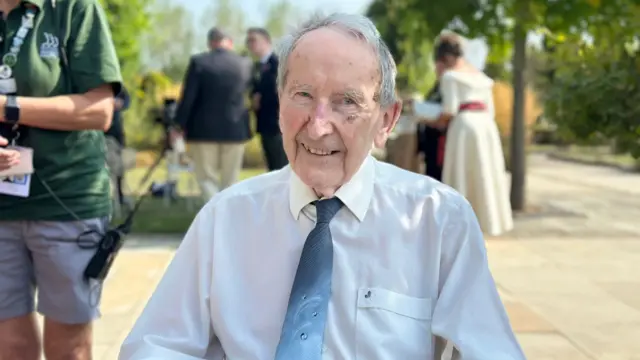
The UK's service to mark VJ day will begin shortly at the National Memorial Arboretum in Staffordshire.
Veterans of the conflict - aged up to 105 years old - are being joined at the site by the King, Queen, and Prime Minister Keir Starmer.
At 12:00 BST, there will be a two minutes' silence held across the country - followed by the rest of the ceremony.
Our coverage of the event has also started, which you can stream by pressing watch live at the top of the page.
Liz Storey
Curator, BBC archives
Signing of the Japanese Instrument of Surrender took place on board the USS Missouri on 2 September 1945, marking the formal end to World War Two.
Cecil ‘Carl’ Carlyon, an Engineer Correspondent with the BBC’s War Reporting Unit, was on board.
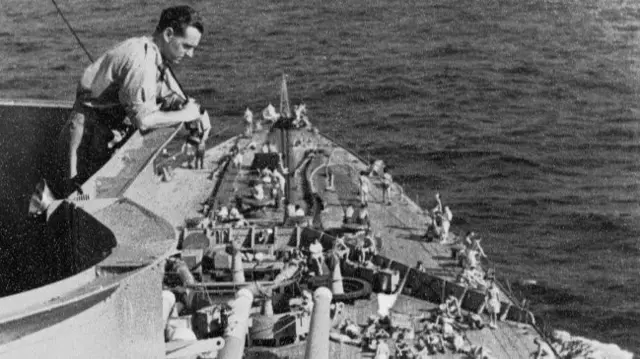
24 August 1945: BBC Engineer Carl Carlyon aboard the battleship HMS Duke of York off the coast of Japan
According to Carl’s diary there were 387 members of the press on deck, and upwards of 3,000 people in attendance: “…this great ship just about packed as tightly as possible with as cosmopolitan a crowd as you could ever wish to see."
All available space was in use, including cameramen perched on the mainmast and the gun turrets.
The ceremony was brief, but atmospheric: “…the great ship absolutely motionless, not a vestige of a tremor anywhere, one could have heard a pin drop.”
Events concluded with a mass flyover of American aircraft, of which Carl wrote: “It was certainly a sight I shall never forget.”
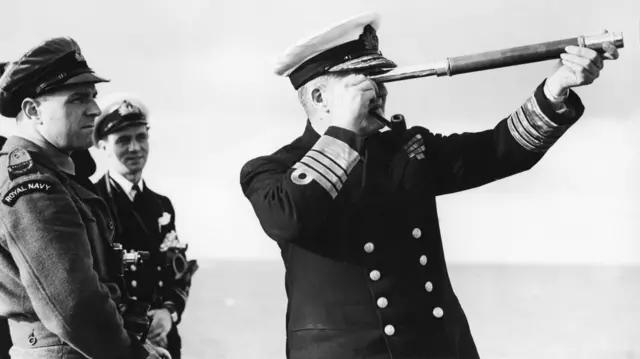
1 September 1945: BBC Engineer Carl Carlyon Lieutenant Dave Cooksey (left) and Admiral Sir Bruce Fraser (right) aboard the battleship HMS Duke of York in Tokyo Bay
 Laura Devlin
Laura Devlin
Reporting from Norwich Cathedral
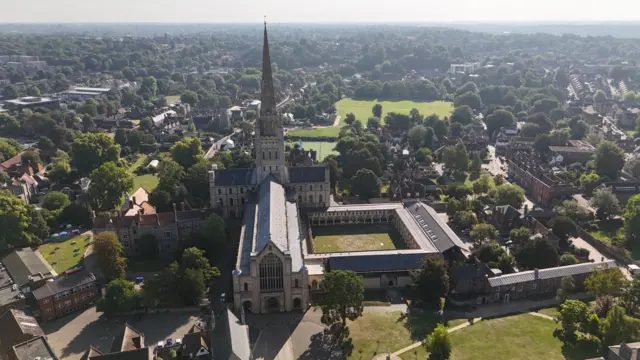
Norwich Cathedral is looking beautiful in the August sunshine ahead of a service of thanksgiving and remembrance.
Hundreds of people are filtering into the cathedral for this morning's service. The area is a hive of activity, with families and holidaymakers also here to enjoy the sunshine, with some posing for photos with family and friends.
The Dean of Norwich, the very Reverend Andrew Braddock, says today's service will be about "the human cost and our common humanity".
"We've been planning this for the best part of two years; it's a significant occasion for us to commemorate and remember those who served in the forces, prisoners of war and the sacrifices they made," he adds.
It was really important, he says, that we honour those who took part in campaigns in the Far East, and the horrors they saw, as much as we do those across Europe and beyond.
Attendees include family members of those who served and people who were child internees, for an opportunity to remember those who often "could not bring themselves to speak to their family and friends" about their experience.
The Duke and Duchess of Gloucester, patrons of the group organising the ceremony, will also be in attendance.
 Ashitha Nagesh
Ashitha Nagesh
Reporting from the National Memorial Arboretum
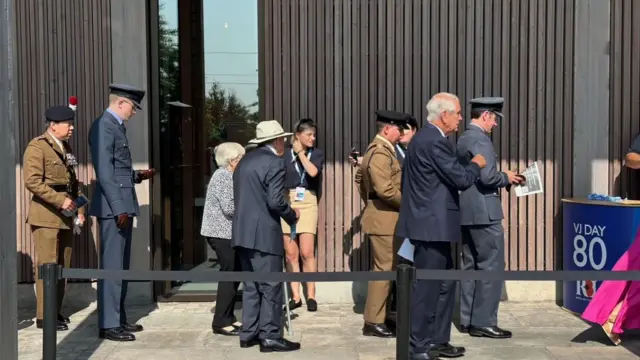
It’s getting busy here at the National Memorial Arboretum, with the 33 VJ Day veterans and other guests having arrived.
It’s also getting hotter - it’s expected to get up to 27C (81F) in this bit of Staffordshire today.
The service doesn’t start until about 11:50, so for now most people are enjoying some shade.
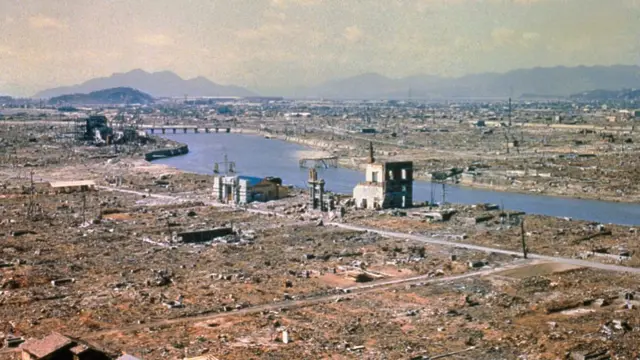 Image source, Getty Images
Image source, Getty ImagesThe city of Hiroshima was left in ruins
Chieko Kiriake remembers seeing a blinding light at 08:15 on 6 August 1945.
“It felt like the sun had fallen - and I grew dizzy,” she recalls.
The United States had just dropped an atomic bomb on Chieko's home city of Hiroshima - the first time a nuclear weapon had ever been used in warfare.
Chieko was a student, but like many older pupils, had been sent out to work in the factories during the war.
She staggered to her school, carrying an injured friend on her back. Many of the students had been badly burnt. She rubbed old oil, found in the home economics classroom, onto their wounds.
“That was the only treatment we could give them. They died one after the next,” says Chieko.
“Us older students who survived were instructed by our teachers to dig a hole in the playground and I cremated [my classmates] with my own hands. I felt so awful for them."
Estimates put the number of lost lives in Hiroshima, by the end of 1945, at about 140,000. In Nagasaki, which was bombed by the US three days later, at least 74,000 were killed.
It has been 80 years since the atomic bombs were dropped, and time is running out for the surviving victims - known as hibakusha in Japan - to tell their stories.
Many have lived with health problems, lost loved ones and been discriminated against because of the atomic attack.
They are now sharing their experiences, documenting the past so it can act as a warning for the future.
Japan announced its surrender on 15 August 1945 and formalised it in a ceremony on 2 September. That marked the end of its occupation over swathes of Asia, though the dark legacy of Japanese rule still looms large in the region’s national narratives.
Korea: Japan’s World War Two surrender marked the end of a 35-year-long occupation of Korea, during which thousands of Korean women were taken as sex slaves - known as “comfort women” - and more than 100,000 Koreans were forced to work in Japanese factories and mines. Both North and South Korea celebrate 15 August as Liberation Day, commemorating when Korea was freed from Japanese colonial rule. In South Korea, the date is known as Gwangbokjeol - the “return of light”, and people are encouraged to display the South Korean national flag.
China: The second Sino-Japanese War, which lasted from 1937 to 1945, is remembered as one of the most devastating wars in history. It killed millions of Chinese civilians - including a notorious massacre in the city of Nanjing. China has designated 3 September, the day after Japan’s formal surrender ceremony, as Victory Day.
South East Asia: Millions died under Japanese rule in South East Asia, where labourers were forced to work on Japanese military projects, women were forced into brothels and men were rounded up for mass killings.
While 15 August is not widely commemorated here, some other dates linked to Japan’s occupation are:
 Yvette Tan
Yvette Tan
BBC News, Singapore
As radios across Japan blared out the Emperor's message of surrender and the end of the Second World War on 15 August - it also marked the end of the Japanese occupation of Singapore.
It was in 1942 when the British army surrendered Singapore to the Japanese.Overnight, tens of thousands of British and Commonwealth soldiers and their families on the island were rounded up and brought to Changi - a prison that was originally built by the British.
Many of these prisoners of war were subject to hard labour, food shortages and poor living conditions, with the prison said to be 16 times over capacity.
The occupation also saw the Japanese commit numerous atrocities against local civilians, some of whom were also subjected to forced labour, torture, rape - and a massacre that saw as many as 50,000 ethnic Chinese males suspected of being anti-Japanese killed.
Tan Kim Wah was 14 when the Sook Ching massacre happened.
"[I saw Japanese soldiers] use a metal wire to pierce through the arms of their prisoners, stringing them together on the same wire – this made it impossible for them to escape. After that, they were loaded onto lorries to be taken to the massacre sites," the 96-year-old told the Straits Times.
Gary Lit, a retired local academic, whose mother lived through the war, told the Singaporean news outlet that similar memories had haunted his mother until her death in 2017.
"She told me, 'Every time I see a Japanese flag, my heart is gripped with fear."
 Shaimaa Khalil
Shaimaa Khalil
Tokyo correspondent
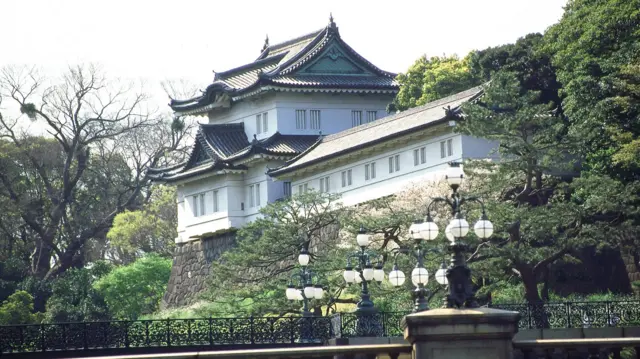
Imperial Palace in Tokyo, Japan
At Tokyo’s Chiyoda Ward you can draw a line between Japan’s present and its past. On one side there’s the Imperial Palace. The official residence of the imperial family and a standing symbol of Japan’s attachment to its traditions to this day.
On the other side is the capital’s bustling business and political district. High rises of office and government buildings, a steady flow of traffic, high-end hotels with the Japanese Parliament not very far from view.
I’m standing opposite the picturesque Seimon Ishibashi bridge that leads to the main gate of the palace - surrounded by lush greenery and tourists taking photos.
It was here, inside the Imperial Palace, eighty years ago that the Japanese people heard their Emperor’s voice for the first time. In a crackling radio address, Emperor Hirohito accepted defeat, ending the Second World War and ushering in a new, uncertain post-war era.
“We all sat in a circle around the radio,” Haruyo Nihei tells me. She was eight when her neighbourhood and the entire downtown Tokyo were flattened in the Great Tokyo Air Raid on the night of 9 and 10 March 1945. One hundred thousand people died in one night.
“At that time, the Emperor was a god to us. It was the first time Japanese people had ever heard the voice of a god, and it was coming from the radio,” she said. “I asked my mother, ‘What did he say?’. She said: ‘The war is over. But Japan lost.’ I stood up and clapped my hands saying, ‘No more air raids!’ I jumped up and down with joy.”
Nihei san told me that her 15-year-old brother who had received intense military education couldn’t accept Japan’s capitulation. “He started hitting me,” she said. “He dragged me out of the room and beat me up in the corner.”
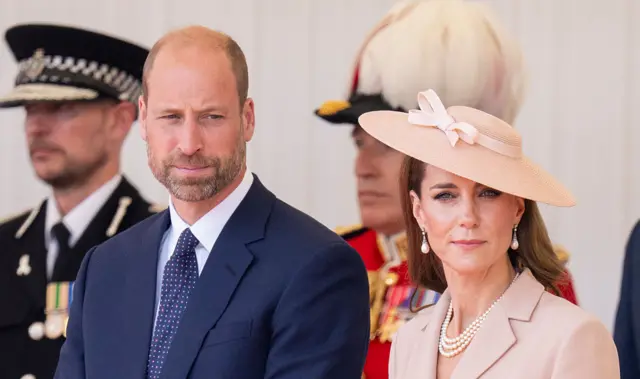 Image source, Getty Images
Image source, Getty ImagesAs we've been reporting, the King and Queen Camilla are due to attend a special service later, marking the 80th anniversary of VJ Day.
Before then, though, the Prince and Princess of Wales have released a statement.
William and Catherine say:
"Today, on the 80th anniversary of VJ Day, we remember the courage, sacrifice, and resilience of all who served.
"Today we especially think of those British and Commonwealth troops who fought in the Asia-Pacific. We owe an enduring debt to the generation who gave so much, and to whom we will always be grateful.
"Lest we forget. W & C"
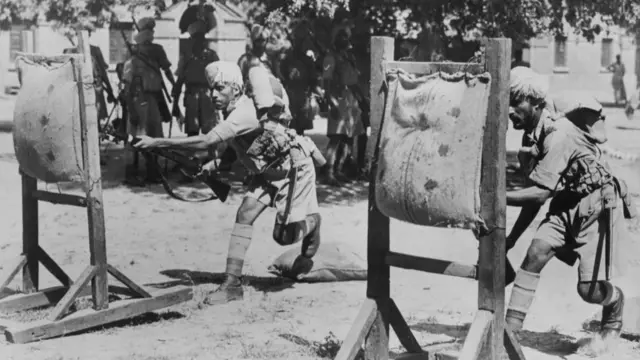 Image source, Getty Images
Image source, Getty ImagesToday's commemoration features personal testimonies and poignant reflections from veterans, who remember leaving home for a far-off country and an unknown enemy.
Thirty-three veterans aged from 96 to 105, who served in Asia and the Pacific will also be present as guests of honour.
They will include Burma Star campaign medal recipients, a veteran of the British Indian Army and those involved in the Battles of Kohima and Imphal, as well as prisoners of war held across the region and veterans stationed in the UK or Commonwealth countries.
While in May 1945 Europe marked the surrender of German forces, a bitter war continued for a further three months thousands of miles from home in the malaria-ridden jungles of South East Asia.
According to the British Legion, 365,000 British and 1.5 million Commonwealth troops had fought across Asia and the Pacific by 1945. Another 2.5 million soldiers from the pre-partition Indian Army were also deployed as part of the largest volunteer army in history.
Those who had fought were largely forgotten by those at home, and after they returned, many were unable to speak of what they had suffered and seen on the brutal battlefields or in the prisoner-of-war camps. There was relief and joy but also sadness at the human cost.
Over 40 languages were spoken by this multinational force, which was instrumental in bringing the war to an end, and this diversity is a central theme throughout the commemoration.
 Shaimaa Khalil
Shaimaa Khalil
Tokyo correspondent
Defeat in World War Two stripped Japan of its military might. Under US occupation, it became a pacifist country. Article 9, introduced under the occupying forces after the war ended, says: "The Japanese people forever renounce war and the threat or use of force."
Japan rebuilt as a democracy and economic powerhouse. But the country has never fully or legally confronted the atrocities committed by its imperial army in China, Korea and across Asia.
There have been many apologies by several leaders, but they’ve always fallen short of fully addressing the specific of Japan’s atrocities and repenting for them. It's a stark contrast to Germany’s reckoning with its Nazi past.
“It’s understandable that overseas people are confused,” says Jeff Kingston, a professor of Asian studies and history at Temple University in Tokyo.
He tells me there’s never been a unified national stance on how Japan views its wartime history – especially with eminent conservative political leaders like the late former prime minister Shinzo Abe. That’s why this part of history is glossed over in school textbooks, for example, and that’s what makes official apologies feel vague and hollow at times.
“Many Japanese leaders have apologised over the years. But they don’t get into specifics about what Japan did. And every time they make an apology or express contrite views there would always be another prominent conservative voice that would deny or denounce these views.”
“It muddies the waters and leaves people convinced that Japan hasn’t grasped the nettle of history the way Germany did.” Kingston says.
The US, too, has never apologised for the atomic bombing of Hiroshima or Nagasaki. Eighty years on, Japan stands as a modern democracy and a global economic power - yet the shadows of its violent past still stretch into the present.
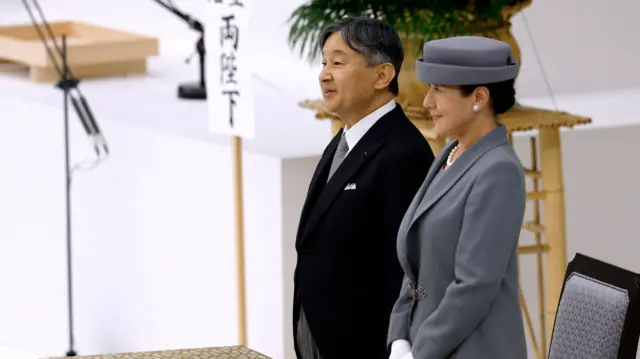 Image source, EPA
Image source, EPAEmperor Naruhito and Empress Masako at the memorial ceremony
Japanese Emperor Naruhito said it was his "sincere hope" that Japan continues to seek peace and happiness as they continue to remember the sufferings endured during and after the war.
In an address during the memorial ceremony in Tokyo earlier today, he said he is overcome with "strong emotion" when he looks back at the "arduous steps taken by the people" so that they can enjoy peace and prosperity today.
"Looking back on the long period of post-war peace, reflecting on our past and bearing in mind the feelings of deep remorse, I earnestly hope that the ravages of war will never again be repeated," he added, as he paid tribute to all who lost their lives.
In a separate speech at the ceremony, Japanese Prime Minister Shigeru Ishiba said “we must never again repeat the horrors of war”.
“We must never again lose our way. We must now take deeply into our hearts once again our remorse and also the lessons learned from that war,” he said.
 Sabbiyah Pervez
Sabbiyah Pervez
Journalist, BBC Look North
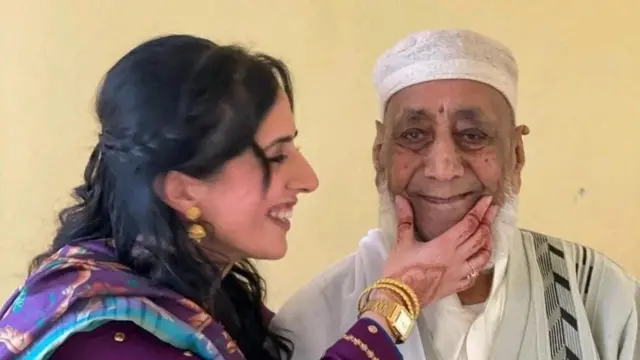 Image source, BBC / Sabbiyah Pervez
Image source, BBC / Sabbiyah Pervez"The Japanese bombed us. They wanted us to die. The bombs fell all around, but I survived," my grandfather tells me.
Mirza Khan, or Baba Ji as I call him, has recently turned 103 and has lived through five monarchs, more than 20 prime ministers and countless wars. But it's World War Two he remembers as a teenager which has stayed with him.
"I have served this country all my life, with all my heart," Baba Ji tells me. "I wanted to join the fight against those who were against this nation.
"As far as I could see it was our motherland, where we laboured and to whom we gave our all.
"We did not differentiate between the English or Muslims in the army."
We will be covering the VJ 80th anniversary commemorations throughout the day - here is a breakdown of today's key events:
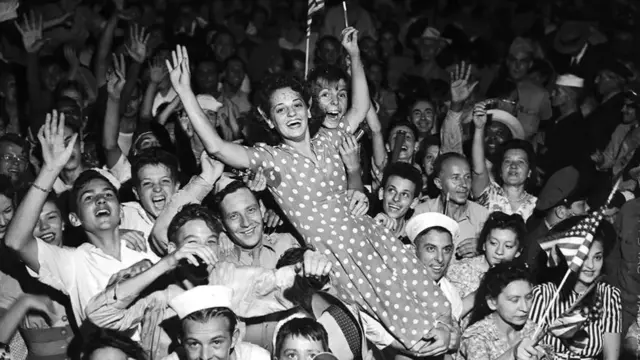 Image source, Getty Images
Image source, Getty ImagesA crowd in New York celebrates the surrender of Japan
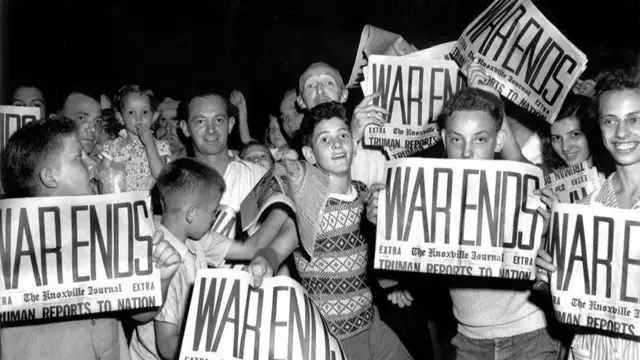 Image source, Getty Images
Image source, Getty ImagesChildren in Oak Ridge, in the US state of Tennessee, hold newspapers declaring the end of the war
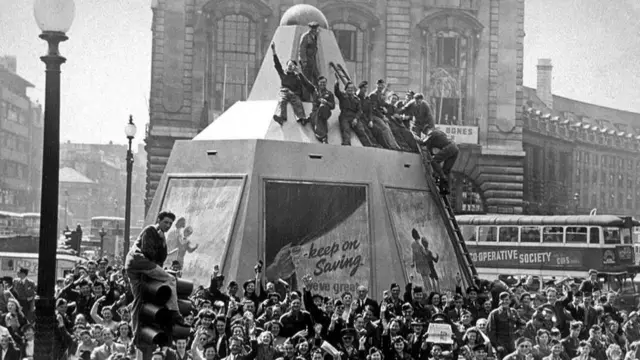 Image source, Getty Images
Image source, Getty ImagesPeople celebrate in Piccadilly Circus, London
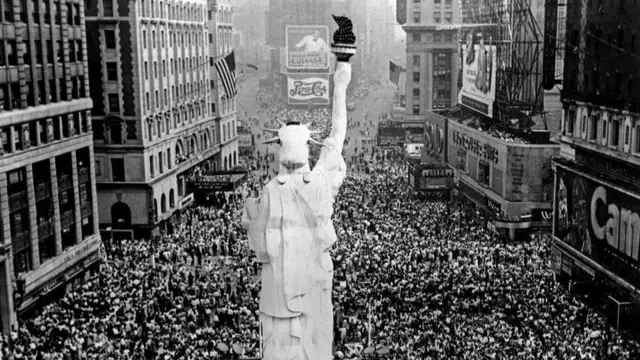 Image source, Getty Images
Image source, Getty ImagesA scaled-down version of the Statue of Liberty is seen as part of VJ Day celebrations in Great White Way, New York City
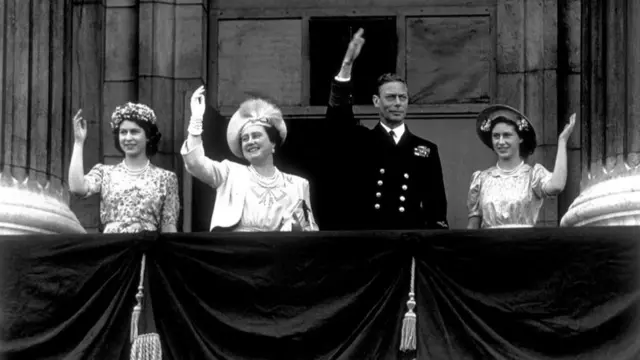 Image source, Getty Images
Image source, Getty ImagesThe Royal Family wave on the balcony of Buckingham Palace on VJ Day: (left to right) Princess Elizabeth, Queen Elizabeth, King George VI and Princess Margaret
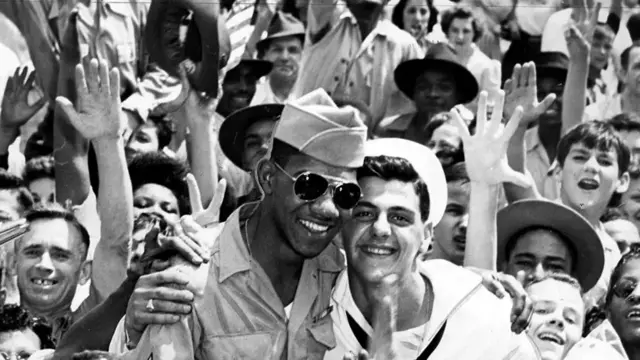 Image source, Getty Images
Image source, Getty ImagesSoldiers join celebrations in Newark, New Jersey, US
 Ashitha Nagesh
Ashitha Nagesh
Reporting from the National Memorial Arboretum
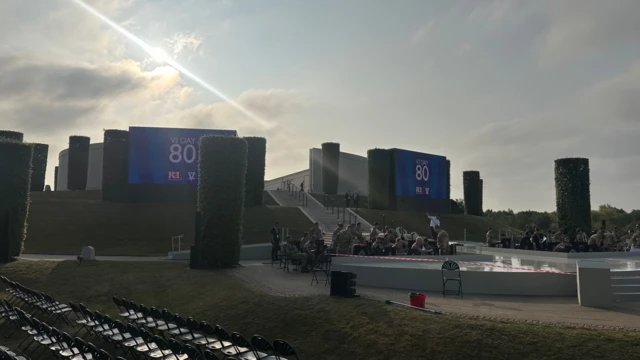
I’m at the National Memorial Arboretum in Staffordshire where, in a few hours, the service marking the 80th anniversary of VJ Day is taking place.
It’s still fairly quiet here, but it’s picking up. For now it’s mainly events staff, military personnel and security who are here (and journalists, of course).
I’ve been able to take a peek at the stage area, where the band is already in place and tuning up.
